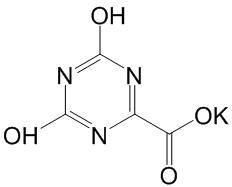These findings suggest that lycopene and/or tomato lycopene extract possess anti-inflammatory properties, partially mediated through inhibition of innate host responses. Crohn’s disease and ulcerative colitis collectively referred to as inflammatory bowel disease are chronic relapsing intestinal inflammatory disorders. Although the etiology of IBD is currently unknown, converging evidence suggests that a pathological synergy exists between defective innate immune responses and uncontrolled lamina propria mononuclear and T cell activation, playing a central role in disease pathogenesis. Key to this dysregulated host response is the presence of intestinal microbiota, which in a genetically susceptible host, activates intestinal immune cells to release a number of inflammatory Diatrizoic acid mediators such as IL-1, IL-6, IL12p40, IL-23p19, TNFa and IFNc. A key transcription factor involved in the production of many of these inflammatory mediators is NF-kB. We previously showed that pharmacological inhibition of NF-kB signaling prevents the development of bacteria-induced colitis in IL-102/2 mice. In the present study, we examined the impact of TLE on LPSinduced innate signaling as well as acute and spontaneous chronic intestinal inflammation. We found that TLE prevents LPSinduced proinflammatory gene expression by blocking NF-kB signaling, through aggravation of DSS-induced colitis by enhancing epithelial cell apoptosis following injury. In this study, we investigated the impact of TLE on LPS signaling in vitro and in experimental colitis. TLE prevented LPSinduced NF-kB Acetylcorynoline activity both in IEC-18 cells and splenocytes through blockade of IkBa degradation, RelA nuclear translocation and transcriptional activity. TLE comprised of numerous components including vitamin C, polyphenols and carotenoids. Though our study has not directly identified the active ingredients responsible for this effect, TLE-mediated inhibition of NF-kB activity was replicated using pure lycopene. Therefore this carotenoid is at least partially responsible for this inhibitory activity. NF-kB drives expression of target genes that function to protect IEC from signal-induced apoptosis as well as promoting restitution of the epithelium. A potential explanation for exacerbated colitis in TLE-treated, DSS-exposed mice may be that TLE impair barrier function thereby increasing the susceptibility of IEC to undergo apoptosis. This possibility is supported by our immunohistochemical and western blot analysis showing that the colon of TLE-fed mice displayed enhanced caspase-3 processing. Increased  caspase-3 processing has been previously associated with DSS-induced colonic tissue damage and colitis. Furthermore, higher number of TUNEL positive IEC were observed in TLEfed, DSS-exposed mice. In contrast, the number of TUNEL positive cells was similar between control diet and TLE fed IL102/2;NF-kBEGFP mice. In addition, TNFinduced apoptosis increased in IEC-18 cells exposed to TLE. These findings support the notion that TLE interferes with NFkB-mediated pro-survival signals leading to increased apoptosis in the injured epithelium, thereby compromising barrier integrity. Since irradiation therapy, bacterial infection and non-steroidal anti-inflammatory drug exposure is associated with intestinal injury, a diet rich in lycopene could potentially interfere with repair mechanisms implicated in the restoration of the epithelium.
caspase-3 processing has been previously associated with DSS-induced colonic tissue damage and colitis. Furthermore, higher number of TUNEL positive IEC were observed in TLEfed, DSS-exposed mice. In contrast, the number of TUNEL positive cells was similar between control diet and TLE fed IL102/2;NF-kBEGFP mice. In addition, TNFinduced apoptosis increased in IEC-18 cells exposed to TLE. These findings support the notion that TLE interferes with NFkB-mediated pro-survival signals leading to increased apoptosis in the injured epithelium, thereby compromising barrier integrity. Since irradiation therapy, bacterial infection and non-steroidal anti-inflammatory drug exposure is associated with intestinal injury, a diet rich in lycopene could potentially interfere with repair mechanisms implicated in the restoration of the epithelium.